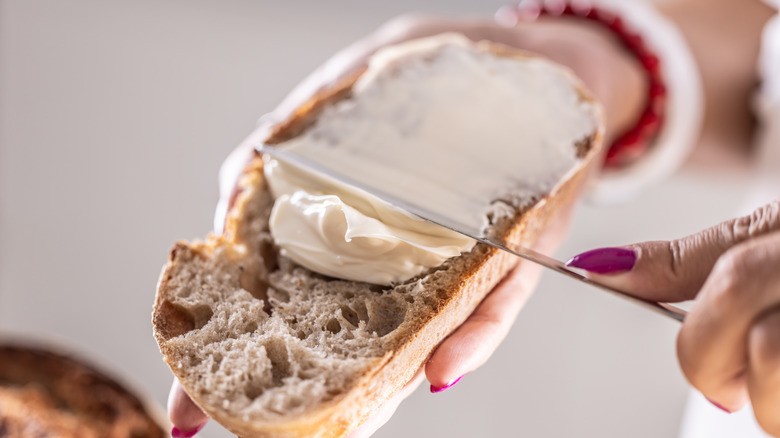Why It's Illegal For Delaware Restaurants To Serve Margarine
The choice between butter and margarine has sparked a lot of debate. Some argue that margarine is better for heart health, while others say that butter is better because it is far less processed and contains natural ingredients.The dairy-loving state of Delaware has taken a hard stance on the divide: There, it's illegal for restaurants to serve margarine unless they notify the customer beforehand.
To be clear, this law doesn't mean that restaurants can't serve margarine alongside toast — it simply requires transparency. If a restaurant chooses to serve margarine or any type of butter substitute, the law states that they must disclose this to diners with a notice clearly written on the menu or on a placard where all customers can see it. This transparency is required in grocery stores, as well – a placard with the word "oleomargarine" (the official name for margarine) must be placed in front of the products, and no brand may use the term "butter" or use any photo of or reference to a cow (Delaware General Assembly).
As strange as it seems restaurants and grocery stores that do not follow these regulations are violating state law. Establishments that do not follow these violations may be fined between $50–250 or possibly imprisoned for a maximum of one year, depending on the severity of the violation.
The history behind the margarine ban
Despite all of the margarine hate, the spread came from a place of necessity. Margarine was originally created as a cheap butter alternative when real butter was scarce in France during the 1860s. The first margarine was a blend of beef tallow and churned milk, and now, modern-day margarine is defined by the state of Delaware as a blend of various fats and oils meant to imitate the look and texture of real yellow butter.
The more affordable butter copycat arrived in the United States in 1871. With a lower price tag, margarine threatened butter sales and the livelihood of dairy farmers. The dairy industry and the states moved quickly: By 1877, a complete ban was implemented by seven states and regulations were introduced to 17 states. Wisconsin was the last state to repeal its total margarine ban in 1967. While you can now legally buy margarine in every state in the United States, a handful of states still maintain regulations like Delaware.
At the time that margarine was introduced to the United States, it was seen as an inferior product to butter. Today, many consumers may still hold this sentiment, and they have the right to know whether or not they are consuming the real deal (at least in some states).

